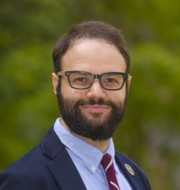Evaluative Clinical Sciences
SRI platforms

Associate scientist
Sunnybrook Health Sciences Centre
2075 Bayview Ave., Room FG 26
Toronto, ON
M4N 3M5
Administrative Assistant: Colleen Barry
Phone: 416-480-4216
Email: colleen.barry@sunnybrook.ca
Education:
- B.Sc. (Honours), 2008, life sciences, Queen’s University, Canada
- MD, 2012, University of Toronto, Canada
- FRCPC, 2017, neurology, U of T, Canada
- Cognitive neurology fellowship, 2019, Harvard Medical School, U.S.
- Harvard Catalyst Clinical and Translational Research Academy, 2019, Harvard Medical School, U.S.
Appointments and Affiliations:
- Associate scientist, Evaluative Clinical Sciences, Hurvitz Brain Sciences Research Program, Sunnybrook Research Institute
- Director, traumatic brain injury clinic, Sunnybrook Health Sciences Centre
- Scientist, Harquail Centre for Neuromodulation, Sunnybrook
- Assistant professor, department of psychiatry, U of T
- Instructor, intensive course in transcranial magnetic stimulation, Harvard Medical School
Research Foci:
- Noninvasive brain stimulation
- Brain network mapping
- Concussion or traumatic brain injury
- Functional neurological disorders
- Placebo effects
Research Summary:
Dr. Burke’s research focuses on trying to understand and treat disorders at the interface between neurology and psychiatry. These include concussion or traumatic brain injury, functional neurological disorders, migraine and other neuropsychiatric disorders.
Prior to joining Sunnybrook Research Institute, he completed the Sidney R. Baer, Jr. Foundation Fellowship in the Clinical Neurosciences at Beth Israel Deaconess Medical Center and Harvard Medical School. This clinical research fellowship provided him with training in novel noninvasive brain stimulation techniques and brain network mapping analyses. His current research looks to apply such approaches to investigate these complex and poorly understood brain disorders.
Dr. Burke also has an active line of research interrogating the neurobiology of placebo effects and how placebo effects may meaningfully modulate brain networks. Though placebo effects were once considered a nuisance in medicine, he believes that they offer new insights for translational research and can be leveraged to optimize clinical practice. His work in this area has led to international media attention on platforms like CNN and BBC.
He recently completed the two-year Harvard Catalyst Clinical Translational Research Academy, a National Institutes of Health-funded program providing advanced training in clinical investigation and commercialization of scientific innovations. His research has resulted in multiple high-level peer-reviewed publications. He was recognized with the American Neuropsychiatric Association's 2019 Young Investigator Award and the American Headache Society’s 2018 Frontiers in Headache Research Award.
Selected Publications:
See current publications list at PubMed.
- Burke MJ, Fried P, Pascual-Leone A. Transcranial magnetic stimulation: neurophysiological and clinical applications [book chapter]. Handbook of clinical neurology. 2019 [in press].
- Burke MJ, Kaptchuk TJ, Pascual-Leone A. Challenges of differential placebo effects in contemporary medicine: the example of brain stimulation. Ann Neurol. 2019 Jan;85(1):12–20.
- Fralick M, Sy E, Hassan A, Burke MJ, Mostofsky E, Karsies T. Association of concussion with the risk of suicide: a systematic review and meta-analysis. JAMA Neurol. 2019 Feb 1;76(2):144–151.
- Darby RR, Joutsa J, Burke MJ, Fox MD. Lesion network localization of free will. Proc Natl Acad Sci USA. 2018 Oct 16;115(42):10792–9
- Burke MJ, Ghaffar O, Staines WR, Downar J, Feinstein A. Functional neuroimaging of conversion disorder: the role of ancillary activation. Neuroimage Clin. 2014 Sep 30;6:333–39.
Related News and Stories:
- Publications by Sunnybrook Research Institute brain scientists were journal's most talked about in 2019: Entries in JAMA Neurology ranked first and second in attention received (Jan. 24, 2020)
- Does Goop need science when it has Gwyneth Paltrow?, CNN (April 6, 2019)
- The placebo paradox, BBC Radio (Feb. 18, 2019)
Related Links:


